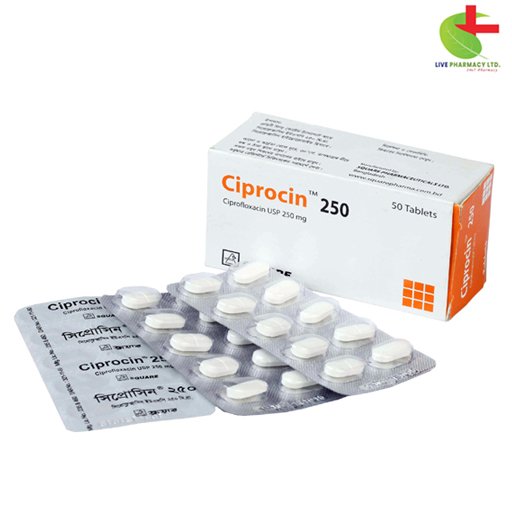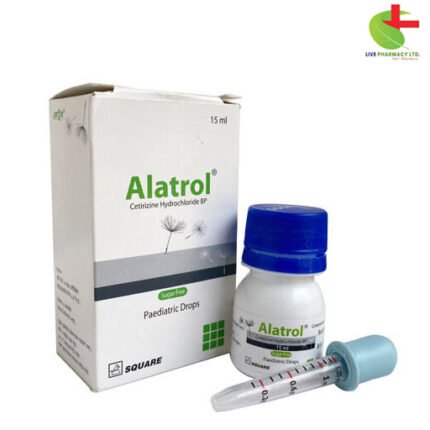Ciprocin 250
8.56৳ Pcs
- Ciprocin: A versatile antibiotic for diverse bacterial infections.
- Broad-spectrum activity targeting urinary, respiratory, gastrointestinal, and skin infections.
- Precise dosing tailored to individual needs for optimal therapeutic outcomes.
- Comprehensive guidance and support for your healthcare journey.
 Brand
Brand
|
Square Pharmaceuticals PLC |
|---|---|
 Generics
Generics
|
Ciprofloxacin |
Indications
Ciprocin serves as an effective treatment for single or mixed infections caused by multiple susceptible organisms, including those resistant to other antibiotics like Aminoglycosides, Penicillins, and Cephalosporins. With its ability to reach antibacterial concentrations in various body tissues, Ciprocin proves beneficial for a wide spectrum of infections, such as urinary, respiratory, and gastrointestinal tract infections, gonorrhea, and septicaemia. Its extensive tissue penetration and potent antibacterial activity, including antipseudomonal activity, allow for versatile use either alone or in combination with other antibiotics, catering to severe infections or specific clinical conditions.
Pharmacology
Ciprofloxacin, a synthetic quinolone anti-infective agent, exhibits broad-spectrum activity against a range of gram-negative and gram-positive aerobic bacteria. Its bactericidal action disrupts bacterial DNA synthesis by interfering with the enzyme DNA gyrase. Rapid absorption from the gastrointestinal tract ensures efficient distribution throughout the body, with a half-life of approximately 3.5 hours. Renal excretion accounts for a significant portion of the drug’s elimination, making it an effective option for various infections.
Dosage
Dosage of Ciprofloxacin is tailored based on infection severity, causative organisms’ sensitivity, and patient factors like age, weight, and renal function. For adults, the dosage typically ranges from 100-750 mg twice daily, with adjustments for specific infections such as urinary tract infections or respiratory tract infections. Special populations, including those with renal impairment or the elderly, may require dosage adjustments for optimal therapeutic outcomes.
Administration
For intravenous infusion, meticulous attention to preparation and administration guidelines ensures safe and effective delivery of Ciprofloxacin. Proper handling of infusion bags and adherence to recommended flow control procedures are paramount to minimize the risk of contamination and ensure therapeutic efficacy.
Interaction
Careful consideration of drug interactions is essential to avoid potential adverse effects and maintain Ciprofloxacin’s efficacy. Concurrent use with certain antacids or dairy products may interfere with drug absorption, necessitating appropriate timing of administration to optimize therapeutic outcomes.
Contraindications
Ciprofloxacin is contraindicated in patients with a history of hypersensitivity to the drug or other quinolones, emphasizing the importance of allergy assessment prior to treatment initiation.
Side Effects
While generally well-tolerated, Ciprofloxacin may cause gastrointestinal disturbances, central nervous system effects, hypersensitivity reactions, and other less common adverse effects. Awareness of potential side effects allows for prompt identification and management to ensure patient safety and treatment adherence.
Pregnancy & Lactation
Caution is advised regarding Ciprofloxacin use during pregnancy and lactation due to potential risks, including arthropathy in immature animals. Careful risk-benefit assessment is necessary when considering treatment in these populations.
Precautions & Warnings
Special precautions should be observed in patients with CNS disorders or those taking medications that may interact with Ciprofloxacin, emphasizing the importance of thorough patient assessment and monitoring during treatment.
Use in Special Populations
While effective, Ciprofloxacin is not the first-line treatment for pediatric populations, warranting careful consideration of alternative therapies in this demographic.
Overdose Effects
In cases of overdose, Ciprofloxacin may lead to various symptoms, including seizures, renal impairment, and reversible toxicity, underscoring the importance of adherence to prescribed dosages and prompt medical intervention if overdose is suspected.
Therapeutic Class
Ciprocin belongs to the therapeutic class of 4-Quinolone preparations and serves as a valuable antimicrobial agent in the management of infections.
Storage Conditions
Proper storage conditions, including temperature control and protection from light and moisture, ensure the stability and efficacy of Ciprofloxacin, safeguarding its therapeutic integrity until use.













Reviews
There are no reviews yet.